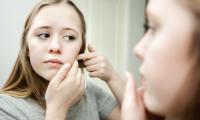What happens during puberty?

During puberty, you begin to pull back from your parents, you become more independent and have clearer opinions. Your mood and your temperament can change very quickly.
For the young person, puberty can feel like a mountain that is impossible to climb. On the one hand, you can feel a longing for teenage life because it means that you are becoming more adult.
On the other hand, it is also a difficult time, because you both have to get used to a new body and new feelings, just like other people around you also have to get used to you changing.
Acknowledge your child's challenges
Being a parent of a teenage child can be challenging. Perhaps it is difficult for you to discern what is challenging your child. Maybe you sometimes think your child is completely unreasonable or difficult to understand.
It is important that you acknowledge your child's feelings and challenges, regardless of how unreasonable or incomprehensible they may seem. Support your child by telling them that puberty is a difficult but also a wonderful time.
1. Knock before entering your child's or teenager's room
2. Ask permission if you need to find something in your child's bag or other private places
3. Ask for permission before posting pictures of your child on Facebook or Instagram - and respect your child's right to privacy on social media as well
You as a parent will rarely be your child's first choice when he or she wants to talk about his or her body and the changes that are going on. If you want to talk to your child, it might be a good idea to talk about the body and puberty in general and not directly about your child's body.
For example, you can start by talking about a film or something else relevant you have seen on TV.
Early puberty
One speaks of early puberty in girls if they start developing breasts before they are 8 years old, or menstruate before they are 9 years old. In boys, signs of early puberty can be their testicles growing before they are 9 years old.
Late puberty
If a girl has not started to show signs of puberty when she is 14 years old, or a boy has not started puberty when he is 15 years old, we speak of late puberty.
However, the lines between early and late puberty can be fluid. Contact the child's doctor or the school's health care if you have any doubts in relation to your own child.
What happens to my son during puberty?
Boys' puberty begins with the growth of the testicles when they are around 12-14 years old. Puberty lasts until they are about 20 years old.
During puberty, the boys' penis and scrotum grow, they develop pubic hair and facial hair, the voice transitions, they get deeper voices, and the testicles begin to produce sperm.
The penis grows throughout puberty and some are almost fully grown by the time the boys are 15, others will grow a lot before puberty ends. In general, it is said that most people´s penis is grown by the age of 17-20.
If a boy has not started puberty when he is 15 years old, we talk about late puberty. Signs of early puberty can be that the testicles grow before the boy is nine years old.
However, the boundaries between early and late puberty can be fluid. Contact the child's doctor or the school's health care if you have any doubts in relation to your own child.
What happens to my daughter during puberty?
Girls' puberty begins with breast development around the age of 10-12. Puberty lasts until they are approximately 18 years old.
During puberty, girls get breasts and pubic hair, the labia grow, and menstruation and ovulation begin so that the girl can become pregnant.
Girls also start having daily vaginal discharge. One speaks of early puberty in girls if they start breast development before they are 8 years old, or menstruate before the age of nine.
If a girl has not started to show signs of puberty when she is 14 years old, one speaks of late puberty.
However, the boundaries between early and late puberty can be fluid. Contact the child's doctor or the school's health care if you have any doubts in relation to your own child.
How do I talk to my child about contraception?
You can educate your child about contraception, but it is a sensitive subject, so it is important to respect your child's boundaries.
There is no recipe for exactly what to say, but a good piece of advice is not to make a big deal out of it - and possibly say "man" instead of "you". And remember to smile :)
If you know or think that your teenager is sexually active - or soon will be - you can buy a pack of condoms for them. Tell your child that he or she should talk to his or her doctor if he or she needs contraception other than condoms and pills.
If your teenager finds it embarrassing to talk to the old family doctor about sex, you can use another doctor.
Should I worry about my child's impure skin?
Pimples occur, because the amount of male sex hormone increases in both sexes during puberty, which increases the production of sebum (skin fat).
Pimples can become very sore and become easily inflamed if pressed or scratched. Mild perfume-free soap daily and a mild scrub cream twice weekly can help keep it down.
Most people find that the pimples disappear again after puberty, but some unlucky people get acne, which is a permanent form of pimples, which doesn't go away easily. Acne can cause sore boils and can cause severe redness and pimples. Not only on the face but also on the back, neck and chest. In such cases, you must have treatment and therefore talk to your doctor.
There are also creams available over the counter at the pharmacy that can help to some extent.




